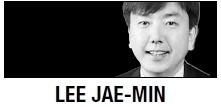 Many people say that Korea’s lowest point in recent history was in November 1997 when the country, reeling from the financial crisis, had to apply for special loans from the International Monetary Fund. November 2016 has now reached a new low.
Many people say that Korea’s lowest point in recent history was in November 1997 when the country, reeling from the financial crisis, had to apply for special loans from the International Monetary Fund. November 2016 has now reached a new low. The 1997 financial crisis is something that can be explained in a logical way: policy misjudgment, capital flow mismatch, and slow reform in the financial market. In contrast, the recent scandal surrounding President Park Geun-hye and Choi Soon-sil has no reasonable explanation.
Instead of the national treasury being hit, it is the national psyche that is suffering.
What is unfolding in the media is something so unbelievable and indescribable that even Korea, with its scandal-prone politics, is in shock. If the people’s frustration and regret over the past several days could be measured, it would show a new level of resentment.
The revelations that surfaced from the discovery of a discarded computer is not just about how a close confidante of the sitting president has swayed national policies and personnel matters. Rather, it shows a much darker side to modern Korea -- decaying morality, materialism, slush funds, personal ties, and cutting in line. What else could be more dramatic?
I attended two international conferences held in Seoul last week. During breaks, curious foreign participants kept asking questions. The conversation was as awkward as it could get. The pathetic tones were almost palpable. I almost wished the ground would swallow me up. Those who meet foreign counterparts and travel overseas would feel the same way. The allegedly religious component of the scandal would be the last thing one could expect from the most wired country with state of the art technology.
What is more worrying is not just the personal embarrassment that we individuals feel in our own foreign encounters, rather it is how other countries view Korea. The national image has been seriously damaged. The unpredictable decision-making process of Korea has been dramatically exposed. Dynamic Korea will become Enigmatic Korea. However, the consequences are not limited to the country’s image. What is being reported in foreign press challenges, though discreetly, the integrity of key foreign policies. They question whether key policies can hold in an abrupt vacuum of the national leadership. They wonder if important decisions can be made promptly.
This foreign skepticism could not come at a worse time -- we are currently facing unprecedentedly difficult challenges on all fronts. The economy is steadily slowing, the security of the country is being threatened, and social disintegration is deepening. Close cooperation with foreign counterparts has become all the more important in overcoming these challenges. At this juncture, diminished foreign confidence will ruin the effort. A costly misstep indeed. Post-scandal management will become a major task in foreign policy.
However, there is a silver lining: the dramatic collapse of the authority of the president, together with its damaging repercussions, has made us all aware of the inherent problems of the current constitutional regime. In the current system, a president is virtually a super-king who can wield more power than Chosun dynasty kings. These days, ministers and advisers hardly say no to a presidential decision. A president is given carte blanche to run the country all alone for five years. New ministries are created and the names of old ministries are changed each term. As the president is not running for election any more, no responsibility is taken. Hopefully, the new scandal can kick-start a serious discussion to mend this systemic problem.
When someone hits rock bottom, they can only climb up. As we did in 1997, we will have to stop a national slide into chaos and crawl out of the ditch to begin a new Korea.
By Lee Jae-min
Lee Jae-min is a professor of law at Seoul National University. He can be reached at jaemin@snu.ac.kr. — Ed.












![[Today’s K-pop] BTS pop-up event to come to Seoul](http://res.heraldm.com/phpwas/restmb_idxmake.php?idx=644&simg=/content/image/2024/04/17/20240417050734_0.jpg&u=)




![[KH Explains] Hyundai's full hybrid edge to pay off amid slow transition to pure EVs](http://res.heraldm.com/phpwas/restmb_idxmake.php?idx=652&simg=/content/image/2024/04/18/20240418050645_0.jpg&u=20240419100350)

![[Today’s K-pop] Zico drops snippet of collaboration with Jennie](http://res.heraldm.com/phpwas/restmb_idxmake.php?idx=642&simg=/content/image/2024/04/18/20240418050702_0.jpg&u=)